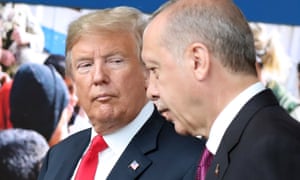
Turkey’s unfolding economic crisis has deepened further after Donald Trump announced he was doubling US import tariffs on Turkish steel and aluminium, stoking the country’s currency freefall and rattling financial markets.
The Turkish lira plunged by more than 20% against the dollar after the president announced the move, amid a widening dispute between Washington and Ankara over the imprisonment of the US pastor Andrew Brunson.
Pressure has been applied on the country in recent days to stage an emergency interest rate rise to avert further economic damage.
Revealing an increase in US taxes on Turkish steel imports to 50% and on aluminium to 20%, the president tweeted: “Our relations with Turkey are not good at this time!”
Even before Trump’s tweet the lira had plunged 14% as investors rushed for the exits, choosing to buy the dollar, yen and other assets seen as safe havens during times of financial market volatility. The lira has been under sustained pressure on foreign exchanges, dropping by almost 50% against the dollar in the past 12 months and hitting a succession of record lows this week.
Inflation reached an annual rate of 15.9% in July – more than five times the average rate for wealthy nations – and government borrowing in foreign currencies has risen dangerously high.
Recep Tayyip Erdoğan, having secured sweeping new powers in presidential elections this summer, tried to restore confidence in the currency on Friday in a speech filled with nationalist rhetoric but offered little to calm the international currency markets.
Raising the spectre of shadowy forces influencing the currency, he told Turks to use “gold under the pillow” to support the lira, while saying: “Don’t forget, if they have their dollars, we have our people, our God.”
Speaking before Trump’s latest Twitter intervention, Erdoğan dismissed the collapse of the currency as artificial financial volatility. He said Turkey would “respond to those who start economic war”.
Financial markets reacted badly and stock markets across the world dropped after Trump escalated the situation on Friday. Shares in European banks with sizeable operations in Turkey fell amid fears of contagion, including Spain’s BBVA, Italy’s Unicredit and France’s BNP Paribas.
Ranko Berich, the head of market analysis at Monex Europe, said the Turkish president’s combative speech had further damaged international trust in its currency. “Erdoğan has reached for the crazy stick and given the lira another whack in a rambling speech that focused more on combative rhetoric than addressing market concerns,” he said.
Observers said the dispute could have broader implications for geopolitics and the situation in Syria and the Middle East if Turkey moves closer to Russia as a result.
David Chmiel of the political consultancy Global Torchlight said: “My initial reaction to the announcement from Trump was this was going to be another perceived knife in the back in terms of Erdoğan’s relations with the west.”
Emergency support from the International Monetary Fund has been mooted as an option for the country to save itself from the deepening crisis, although there are questions over whether Erdoğan would accept the strings that would come with any bailout deal.
Given the sizeable personal control Erdoğan commands over the running of the Turkish economy – after granting himself the right to appoint the central bank’s governors and naming his son-in-law as finance minister – economists reckon the government will attempt to muddle through.
But the Turkish central bank has limited foreign exchange reserves to deploy to support the lira, stoking talk among economists of the nation using capital controls to halt the flow of money leaving its shores instead.
Analysts said raising borrowing costs aggressively in the coming days could help. Paul Greer of the fund management company Fidelity said raising interest rates by 1,000 basis points would be a “good start”, although he said this would probably tip the economy into recession.
Large sums borrowed in foreign currencies make Turkey especially vulnerable to a falling domestic currency because it becomes more expensive to pay off its debts.
source:-.theguardian




